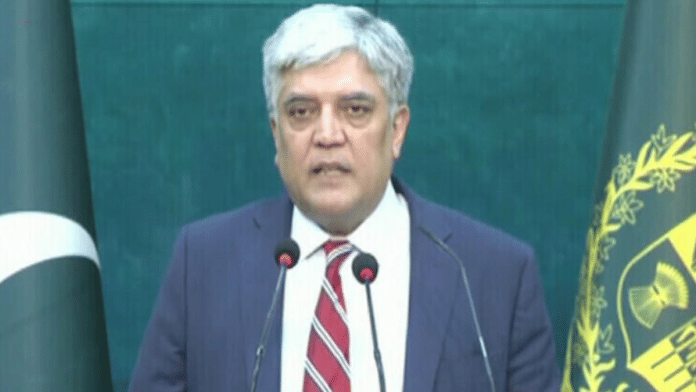New Delhi: Pakistan has accused India of disregarding international norms by acting as “judge, jury and executioner” in its response to the Pahalgam terror attack, and claimed New Delhi’s “jingoism and war hysteria” have brought the two nuclear-armed nations dangerously close to a conflict.
“This reckless conduct should be a source of serious concern for the world,” Foreign Office spokesperson Shafqat Ali Khan told a weekly press briefing in Islamabad.
He claimed India relied on “anonymous and dubious social media posts” for its accusations against Pakistan. “Can any country in the world be allowed to attack another country on the basis of a few social media posts?”
The spokesperson said Pakistan reserves the right to defend itself under the UN charter, while he urged the international community to respond to what he described as India’s “destabilising” behaviour.
Khan claimed India has not been able to produce any credible evidence to date to support its accusations against Pakistan after the Pahalgam attack “and thus it is India that has escalated the situation by violating Pakistan’s sovereignty and killing civilians”.
Addressing a press conference in New Delhi Thursday, Indian Foreign Secretary Vikram Misri said the “original escalation” began with the Pahalgam terrorist attack which left 25 Indians and one foreign national dead, and that India’s response—Operation Sindoor—was “restrained” and directed towards terrorist camps.
Under Operation Sindoor, India has said it targeted nine terrorist complexes in Pakistan and Pakistan-occupied Kashmir. It has maintained no civilians were harmed in the attack.
However, at his briefing Friday, Foreign Office spokesperson Khan claimed India has “escalated” the situation by “violating Pakistan’s sovereignty and killing civilians”.
“The Pakistani forces did not attack Pahalgam but the Indian forces did attack multiple locations in Pakistan,” Khan said. “Accordingly, Pakistan reserves the right to take all appropriate measures in its self-defense as enshrined in Article 51 of the UN Charter.”
He said Pakistani Prime Minister Shehbaz Sharif proposed a “transparent and independent” probe into the Pahalgam attack through neutral investigators; however India chose the path of “belligerence and aggression”.
“We are amazed to see the importance that the Indian government attaches to the anonymous and dubious social media posts upon which it has built the case for The Resistance Front’s involvement in the Pahalgam attack,” he said.
“India is attempting to act as the judge, jury and executioner… The assertion that Pakistan escalated the situation is totally absurd,” he further claimed.
He also accused India of ignoring international calls for restraint, including those from the United Nations and the Organisation of Islamic Cooperation (OIC). “It is highly deplorable that India did not pay heed to these calls,” he said, asking the global community to hold India accountable for what he called “irresponsible, unlawful and belligerent conduct”.
Khan also addressed broader issues in bilateral relations, including investigations into the 2008 Mumbai terror attacks and the 2016 Pathankot attack, blaming “India’s non-cooperative attitude” for the lack of progress.
In his briefing in Delhi Thursday, Misri said Pakistan was consistently stonewalling all efforts to move the investigation along.
On the Indus Waters Treaty, the Pakistan FO spokesperson said India’s decision to hold it in abeyance is “unilateral and illegal”. He accused New Delhi of attempting to “weaponise water”.
The treaty remains binding, Khan said, adding India’s move sets a “dangerous precedent” of disregarding international agreements.
“This action shows India’s blatant disregard for international treaties and sets a dangerous precedent. The treaty remains in force and fully binding on the parties. The Indian allegation of Pakistan’s refusal to enter into government-to-government negotiations is also incorrect… Pakistan has been continuously engaged with India on the subject,” he added.
(Edited by Ajeet Tiwari)
Also read: Pakistan used Turkish drones, with civil airliner as shield. India then hit its radar station






